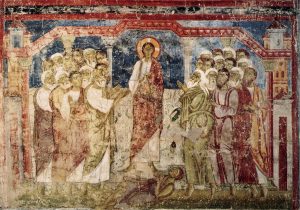Thoughts on Sunday’s Lessons for Jan. 28, 2024 (Epiphany 4B)

Jesus Drives Out an Evil Spirit (Mc. 1412-1416), from the Très Riches Heures du Duc de Berry, a French Gothic illumination for the Book of Hours by the Limbourg Brothers, Herman, Paul and Johan, now in the Musée Condé, Chantilly, France. (Click image to enlarge.)
First Reading: Deuteronomy 18:15-20
The ongoing theme of listening for God’s voice and trying to discern what God is calling us to do continues in our readings for the Fourth Sunday of Epiphany. Our first reading is a passage from Deuteronomy, the fifth and final book of the Torah. We open the book as the story of God’s covenant with Israel is drawing to its close. Moses is in his last days. He will not live to enter the Promised Land. But then, the people wonder, how will they know God’s wishes once their longtime prophet is gone? Moses reassures them that God will raise up another prophet like him from among the people: a prophet who will speak God’s words and whom God will hold accountable.
Psalm: Psalm 111
Psalms, the hymns and worship poetry of the ancient Temple in Jerusalem, offer many forms of prayer. Some ask God’s favor. Some cry out in lament. Others sing thanks for blessings. Yet many of the most joyous Psalms – like the familiar verses of Psalm 111 as a resounding example – exultantly sing God’s praise. God’s work, God’s majesty, God’s splendor, God’s justice, all last forever. God feeds us. The fear (meaning awe) of God is the beginning of wisdom.
Second Reading: 1 Corinthians 8:1-13
These verses offer us a fascinating insight into Paul. This pastoral question about eating meat that had been sacrificed in pagan temples might not seem to say much to us as inhabitants of a modern technological society. In his context, though, Paul understands the Corinthian Christians’ notion that pagan gods aren’t God at all, so sharing temple food – their primary source of meat – could be morally neutral to believers who are strong in their faith. The rest of Paul’s conclusion transcends time: Even if we do nothing wrong, Paul asserts, our actions may influence others, and Christ calls us to be mindful of that.
Gospel: Mark 1:21-28
We continue following Mark’s account of Jesus’ early ministry in Galilee. Baptized, returned from his time in the wilderness, and having chosen his disciples, Jesus now steps up and speaks for the first time during Sabbath services in Capernaum, the small Galilean town where he was active. Two remarkable things happen: First, this stranger amazes the community with bold teaching that reveals him as one “having authority.” Then Jesus further astounds the people by commanding a noisy unclean spirit to come out of a troubled man. Unclean though the spirit may be, it shouts wisdom, declaring Jesus “the Holy One of God.”



